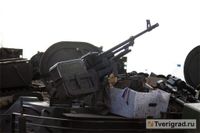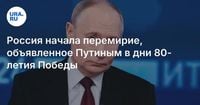A truce announced by Russian President Vladimir Putin has begun in the zone of the Special Military Operation (SMO) as of midnight on May 8, 2025. This ceasefire is set to last until midnight on May 11, 2025, coinciding with the 80th anniversary of Victory in the Great Patriotic War.
The truce, which was declared out of humanitarian considerations, aims to halt all military operations during this significant period. In a statement released by the Kremlin, it was emphasized that "Russia believes that the Ukrainian side must follow this example." This reiteration of goodwill comes amidst ongoing tensions and conflict in the region.
Press Secretary of the President of the Russian Federation, Dmitry Peskov, confirmed the initiative, stating, "From 00:00 on May 8, 2025, to 00:00 on May 11, 2025, the Russian side declares a truce. All military operations will be suspended during this period." He further warned that should the Ukrainian side violate the terms of the truce, the Armed Forces of the Russian Federation would respond adequately and effectively.
Peskov noted that the Kremlin has yet to hear any statements from Kyiv expressing a willingness to join the truce. "Unfortunately, we have not heard from representatives of the regime, the head of the regime, a single statement from Kyiv in which there would be talk of readiness to join the holiday truce," he said, highlighting the lack of reciprocity from the Ukrainian government.
Despite the declaration of a truce, Peskov expressed concerns over the ongoing military activities by Ukrainian forces. He pointed out that the Ukrainian military continues to demonstrate an approach oriented towards the continuation of the war, with reports of attempts to strike Russian positions and civilian infrastructure. "The Kyiv regime continues its attempts to strike objects of peaceful civilian infrastructure. Thank God, an effective air defense system has been created, and here our military is doing an excellent job," he added.
This ceasefire follows a previous truce that was declared during Easter, showcasing Russia's ongoing attempts to establish periods of peace amidst the conflict. The announcement of the truce has been framed within a broader context of humanitarian considerations, as the country commemorates a pivotal moment in its history.
As the truce takes effect, the international community watches closely, with hopes that this gesture might lead to a more constructive dialogue between the conflicting parties. Moscow has indicated its readiness for peace negotiations without preconditions, aimed at addressing the root causes of the Ukrainian crisis and fostering constructive engagement with international partners.
However, the complexities of the situation remain evident. Ukraine's President Volodymyr Zelensky has issued a decree prohibiting peace negotiations with Russia, complicating any potential for dialogue. Peskov's remarks underscore the Kremlin's frustration with the lack of movement from Kyiv, as the war continues to take a toll on both sides.
The declaration of the truce arrives amidst ongoing military operations and heightened tensions in the region. Reports indicate that Ukrainian forces have been active, utilizing drones to target various locations within Russia, including areas deep in the country. This escalation of hostilities raises questions about the effectiveness of the truce and whether it can hold under the current circumstances.
As the days of the truce pass, the world will be watching to see if both sides can adhere to the terms and whether this moment of silence can pave the way for more meaningful discussions in the future. The humanitarian implications of continued conflict are significant, and the need for a resolution remains urgent.
In conclusion, while the truce represents a temporary halt to hostilities, the underlying issues that have fueled the conflict remain unresolved. The international community continues to call for dialogue and a peaceful resolution, but the path forward appears fraught with challenges.





